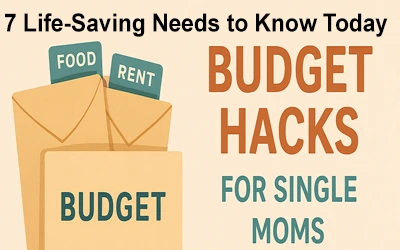
Budgeting Tips for Low Income Families
Budgeting Tips for Low Income Families: 1০ Smart Ways to Manage Money
Feeling like your paycheck disappears before the month ends?
You’re not alone. For many low-income families in the USA, budgeting isn’t just about saving money—it’s about surviving. But here’s the truth no one really tells you: you don’t need to be a financial genius to manage your money wisely. You just need the right approach, some realistic tools, and a few habits that stick.
How to budget money on a low income
In this guide, we’ll break down budgeting tips for low income families that actually work—without making you feel deprived or overwhelmed. And yes, we’ve also tucked in a cash prize reward opportunity you can grab while applying these tips. Let’s get into it.
Why Budgeting Feels So Hard (But Doesn’t Have to Be)
Let’s be real—budgeting sounds boring, restrictive, and often stressful. But for low-income families, it’s often a lifeline.
The problem? Most budgeting advice feels made for people who already have extra money to work with.
That’s why we’ve created a list of real-world money management tips tailored for households with tight finances. These aren’t generic “cut your latte” tips. These are strategies rooted in the daily reality of families who need every dollar to stretch.
1. Start With a Bare-Bones Budget (The Real Deal)
Forget fancy apps and complicated spreadsheets. Start with what’s called a bare-bones budget—just list your absolute essential expenses:
- Rent or mortgage
- Utilities
- Groceries
- Transportation
- Medicine or health-related costs
Now match that with your actual income. What’s left? That’s what we work with next.
👉 Pro tip: Use a notebook or free printable budget sheet. Keep it visual. Writing it down makes it real.
2. Meal Planning Saves More Than You Think
Food is one of the few flexible categories where you can save hundreds each month. How?
- Plan your meals weekly based on what’s on sale
- Use store loyalty apps (Walmart, Kroger, Target Circle)
- Cook in bulk and freeze extras
- Skip impulse snacks and prep homemade ones
You’ll not only cut your grocery bills but reduce food waste—a double win for frugal families.
3. Use the Envelope Method (Cash Works Wonders)
Digital spending is sneaky. The envelope method is old school—but powerful.
Here’s how:
- Label envelopes by category: gas, groceries, essentials
- Put the exact cash amount in each
- When it’s gone, it’s gone—no more spending in that category
This physical barrier creates better control. It’s one of the best budgeting tips for families living paycheck to paycheck.
Monthly budget plan for low income households
4. Track Every Dollar for 30 Days (Even the Gum)
You can’t fix what you can’t see. For one month, write down every single dollar you spend. Yes, even that $1.50 coffee.
By the end of the month, you’ll see patterns you never noticed:
- $30 a week on takeout?
- $20 on random gas station snacks?
- $40 on subscription services you forgot about?
These little leaks cost you hundreds over time.
5. Slash Utility Bills with Small Habit Shifts
Low-income households often overpay for utilities simply due to habit. Try this:
- Turn off lights in empty rooms
- Wash clothes in cold water
- Use ceiling fans instead of AC during cool hours
- Unplug unused electronics (vampire power is real)
Want to cut your energy bills fast?
👉 Check out our guide: 9 Ways to Cut Utility Bills This Month
6. Avoid Debt Traps—Even the “Small” Ones
Payday loans. “Buy now, pay later.” Store cards with 29% interest. These are debt traps disguised as helpers.
If you’re already in debt:
- Call lenders and request hardship plans
- Use non-profit credit counseling agencies
- Pay smallest debts first (debt snowball method)
Building a solid budget means protecting what little you have from unnecessary fees or interest.
7. Tap Into Community Resources (They Exist for You)
You’d be surprised how many resources exist in your area—especially if you’re earning below a certain threshold.
Look for:
- Local food banks
- Utility bill assistance programs
- Free school lunch & breakfast programs
- Diaper banks, clothing closets
- Free or low-cost clinics
These aren’t handouts. These are community safety nets meant to support you.
Frugal living tips for single income families
8. Create a “Rainy Day” Jar, Even If It’s $2 a Week
Savings seems impossible on a tight budget—but even $2 or $5 per week adds up. Use a jar, a piggy bank, or even a separate bank account with no debit card.
Label it: Emergency Fund.
This isn’t just money. It’s peace of mind.
9. Buy Used—Not Cheap, But Smart
Secondhand isn’t shameful. It’s smart financial strategy.
- Buy kids’ clothes at thrift stores or FB Marketplace
- Check refurbished tech for school and work needs
- Use neighborhood buy/sell/trade groups
One family’s “old” is another family’s lifeline.
10. Earn While You Budget: Grab a Small Cash Prize
Saving money is great—but what if you could earn while doing it?
👉 Here’s your chance: Get a Cash Prize worth up to $500 just for exploring money-saving programs in your area.
No hidden catch. No credit card needed. Just complete a short form and see if you qualify.
Click The “Get Cash Prize” button below to claim the Cash Prize.
You’re already budgeting. Why not get rewarded for it?
Real Talk: Mindset Over Money
You might feel like everyone else has it easier—but behind closed doors, most families are just trying to hold it together.
Budgeting isn’t about being cheap—it’s about taking back control, one choice at a time.
If you’re reading this, you’re already doing better than most. You’re looking for answers. You’re trying. That matters.
So keep going.
Bonus Tips for Low-Income Families to Stretch Every Dollar
- Swap, don’t shop – Organize neighborhood swap events
- Try no-spend weekends – Challenge your family to use only what’s at home
- Use cash-back apps – Ibotta, Rakuten, and Fetch can give you small returns on everyday purchases
- Sell unused items – Old toys, clothes, and gadgets can be quick cash
- Apply for child tax credits – Many families don’t even realize they’re eligible
Every dollar saved or earned is a dollar closer to breathing room.
Simple budgeting strategies for struggling families
Your Turn: Take the First Step Today
Don’t wait until “things get better.” Start with just one of the budgeting tips for low income families from above. Even if it’s simply writing your expenses or tracking meals.
And remember—this isn’t a sprint. It’s a slow, strong walk toward stability.
Best budgeting methods for paycheck to paycheck living
People Also Asked
Q. What are some real budgeting tips for families that only have one income?
Answer: If you’re depending on one income, every cent has to be handled carefully. Start by listing just your essential bills—rent, groceries, gas, and utilities. Anything left should be planned ahead, not spent on impulse. Track your expenses in a notebook for at least a month. That alone shows you where money’s leaking. Cut out little habits like random snacks or online shopping. Cook in bulk, avoid food waste, and use secondhand when you can. It’s not easy, but small routines make a huge difference when stretched over time.
Q. How can low-income families save money on groceries without sacrificing meals?
store flyers before shopping and plan your meals around what’s on sale, you’ll already save more than you think. Buy bulk for items you use often. Stick to a list and cook double to have leftovers. Avoid fancy brands—store versions are usually fine. Oh, and never shop hungry! You’ll walk out with things you didn’t need. With a bit of prep, you can eat well without overspending.
Q. Which budgeting apps are good for low-income earners?
Answer: You don’t need to pay for a fancy app to manage your money. Apps like Goodbudget and Mint are free and super helpful. Goodbudget uses an envelope-style system, and Mint tracks all your spending. They let you see where your money’s going without confusing charts. Just be careful not to sign up for premium versions if you don’t need them. The free versions usually give you more than enough to start budgeting smart, especially if you’re on a tight income.
Q. Does the envelope method still work today?
Answer: Believe it or not, yes—it works even better now. When you use real cash for things like groceries, gas, or fun money, you feel how fast it disappears. That’s the point of the envelope method. Once the cash in that envelope is gone, you stop spending in that category. It’s simple, visual, and makes you think twice before overspending. Sure, it feels old-school in a world full of cards and apps, but that’s also what keeps it effective.
Budgeting Tips for Low Income Families
Q. How do families break out of the paycheck-to-paycheck trap?
Answer: It starts with noticing where your money is actually going. Write down everything—even the little stuff. Then cut out anything that’s not a need. That’s hard at first, but freeing in the long run. Save whatever you can, even if it’s just five bucks a week. Don’t wait to “have more.” Use tools, ask for help, and slowly build a buffer. Once you’ve got even a little saved, life feels less tight. It’s a slow path, but very doable.
Q. Are there any printable budget sheets that work for struggling families?
Answer: Yes, and they’re a big help if you like seeing things on paper. Lots of websites have free budget sheets you can print. They usually list basic stuff—housing, food, gas, and other bills. You fill in the numbers and see what’s left. It sounds simple, but when it’s in front of you, it sticks in your head better. Google “free printable family budget” and pick one that looks clean and easy to use. Sometimes the old-school way just works best.
Q. What kind of government support exists for low-income families in the US?
Answer: Many people don’t know, but there are many types of government support for low-income families in the US. For example, the SNAP program provides food assistance for people with low income, WIC provides nutritional assistance for mothers and young children, and LIHEAP helps reduce gas and electricity bills during the winter. In addition, many states and counties run special programs for housing or medical care. You can contact local aid organizations in your area by calling 211. In addition, many families get money back from tax credits. Finding these types of assistance can reduce a lot of financial stress.
Q. Is it possible to create an emergency fund when earnings are already squeezed?
Answer: Yes, you absolutely can—and it doesn’t need to be huge right away. Just saving a few dollars each week adds up. For instance, putting $2 or $3 into a jar, envelope, or even a separate free savings account creates a habit, not pressure. Skipping a treat or small impulse purchase each week is all it takes. Over months, that small fund can absorb unexpected costs like a flat tire or minor medical cost. It’s not about building a fortune—it’s about having just enough to keep a surprise expense from derailing your month, and that peace of mind is priceless.
Budgeting Tips for Low Income Families
Q. How can families keep clothing costs low when kids outgrow everything so fast?
Answer: Kids grow faster than clothes last—but you don’t need to keep buying brand-new. Thrift stores, seasonal clearance sales, and local resale groups like Facebook Marketplace are goldmines. Clothing swaps with neighbors or friends let you trade kids’ items for free. Buying a size up gives extra months of wear. Choose basics in neutral colors that mix and match easily. Some stores offer trade-in credit for gently used items too. Buying winter jackets in spring or summer tees in fall can save big. These strategies keep your kids clothed well without draining your budget.
Q. How can low-income households trim their monthly utility bills?
Answer: Look, it doesn’t take any big magic to reduce utility bills at the end of the month. You just have to keep a few small things in mind and work. Turn off the lights when you leave the house, and unplug the electronics you are not using. Because, many times they consume electricity even when they are off. Wash clothes in cold water, it saves a lot of money than using hot water. Installing LED bulbs reduces electricity costs, and you can run a fan in the heat, and run the AC if necessary. Ask the utility company, they often give special discounts or payment plans, which not everyone knows. If you maintain all these habits, the bill will be reduced in a few months.
Claim Your Reward Before It’s Gone!
Why not earn a little extra boost while building your budget habits?
👉 Get a Cash Prize Now »
No gimmicks. Just a chance to get rewarded for doing what you’re already trying to do: manage your money better.



